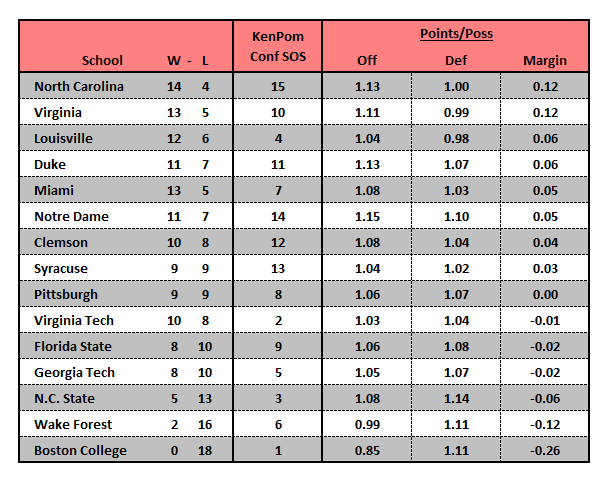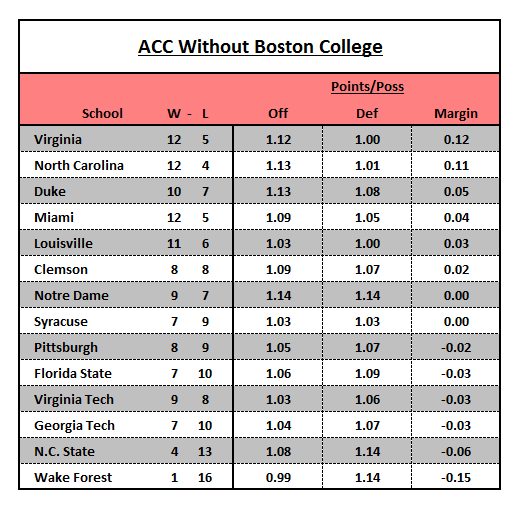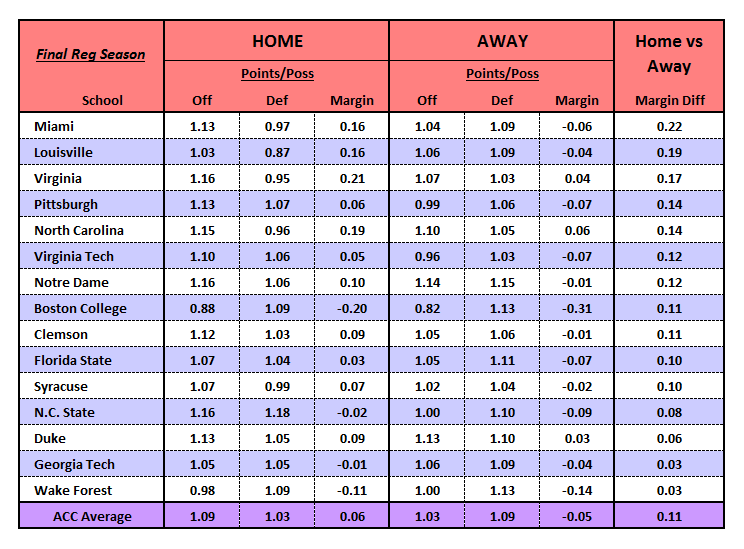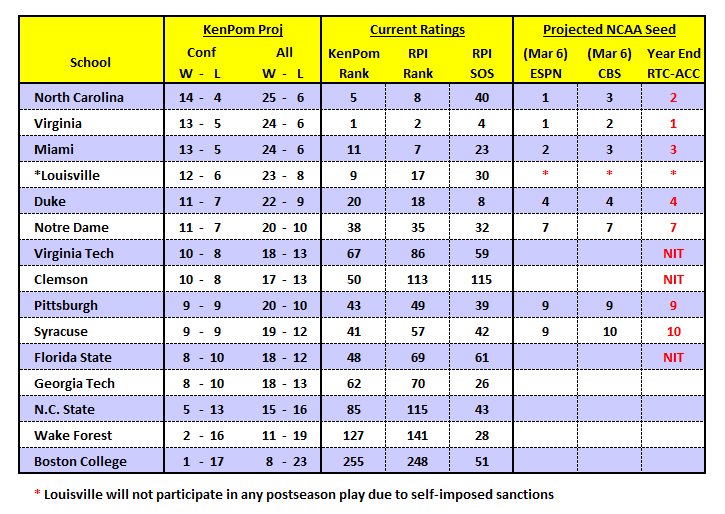Inside the ACC Numbers: Volume VII – Final Edition
Posted by Brad Jenkins (@bradjenk) on March 7th, 2016Here is the final edition of our weekly look at the ACC standings and team performances, where we focus on which teams are playing better or worse than their records might indicate. This week we also examine how each ACC team performed on the road compared with its home performances, and we take a final stab at predicting postseason placement for all of the eligible ACC schools.
Note: All numbers are current for games played through Saturday, March 5.
Current Standings
North Carolina and Virginia were pegged in the preseason as the two best teams in the ACC and that’s exactly how it turned out. Each team went through a tough stretch of games — Virginia began conference play with a 2-3 record while North Carolina was 4-4 in the month of February, but the Tar Heels and Cavaliers will enter the ACC Tournament as the clear co-favorites based on efficiency margins and seeding. Speaking of that, both teams are also still in the hunt for #1 seeds in the NCAA Tournament along with favorable opening weekend placement in friendly Raleigh.
Notre Dame dethroned Duke as the league’s most efficient offense for the first time in seven seasons. The Irish attack is powered by the lowest conference turnover rate (13.3%) in the 15-year KenPom era and the best league free throw percentage (77.4%) in the last seven years. Despite getting worked over by Virginia on Saturday night, Louisville held on to its lead in defensive efficiency, holding off the Cavaliers from having the ACC’s best defense for a third consecutive season. The Cardinals led the league in forcing turnovers (20.6%) and finished a close second to North Carolina in effective field goal percentage defense.
Without Boston College
Here we see the most dramatic effect of the ACC’s unbalanced schedule. The four schools that were fortunate enough to play Boston College twice have far less impressive efficiency margins when the Eagles are removed from consideration. In particular, Notre Dame and Syracuse look downright ordinary once you remove their two easy wins. Clemson and North Carolina also benefited from their two meetings with the first 0-18 team in ACC history, albeit to lesser degrees. Perhaps the most shocking game in ACC play this season was the Tar Heels’ comeback win at Boston College on February 9. What would have happened to UNC’s confidence and reputation if it hadn’t rallied late for a three-point victory? If Roy Williams’ group makes a long postseason run, it may look back at that unlikely challenge as the season’s turning point.
Advanced Stat of the Week: Home and Away Performance Comparison

The first thing to note here is that home court advantage was especially relevant in the ACC this season. Home teams won roughly two-thirds of league games (65.9%), ranking sixth among the nation’s 32 conferences. Despite its lofty overall record, Miami really was a Jekyll and Hyde team depending on location. The Hurricanes simply do not defend well away from Coral Gables, giving up a whopping 0.12 more points per possession on the road. Louisville was even more one-sided in its stellar defensive play — the Cardinals were fairly average in stopping opponents away from home, but downright stifling at the KFC Yum! Center. Three teams were dramatically better offensive units at home — Pittsburgh, Virginia Tech, and North Carolina State — which helps to explain why that trio pulled off some big upsets this season over visiting heavyweights. Of course, with none of those three teams playing at home this week, don’t expect any surprising offensive explosions from them in the upcoming ACC Tournament.
Future Forecast

The chart above provides a predicted order of finish in the ACC, with final regular season records based on KenPom’s current win probabilities for each team. Also included are a few comparative rankings that are mentioned frequently when evaluating NCAA Tournament potential, as well as projections from two bracketology experts, ESPN‘s Joe Lunardi and CBS Sports‘ Jerry Palm. Note that while these two bracketologists project the field as if it were named tomorrow, we make our projections based on the final KenPom projected records. One of either Virginia or North Carolina is in good if not great position to earn a coveted #1 seed by winning the ACC Tournament this week, but a loss for either will probably eliminate that possibility. The Cavaliers (9-2 vs. the RPI top 50) have a stronger overall resume than the Tar Heels (4-5), so even if North Carolina adds an ACC Tournament title to its regular season crown, there’s no guarantee that they will find a placement on the top line. Miami, as a historical example, had a similar resume in claiming both the ACC Tournament and regular season titles three years ago, but the Hurricanes were slotted as a #2 seed. Some might be inclined to call the Pittsburgh–Syracuse matchup on Wednesday a Big Dance elimination game, but we don’t see it that way. While the winner should certainly feel safe about making the field of 68, the loser shouldn’t suffer much damage by losing to a quality opponent.










































